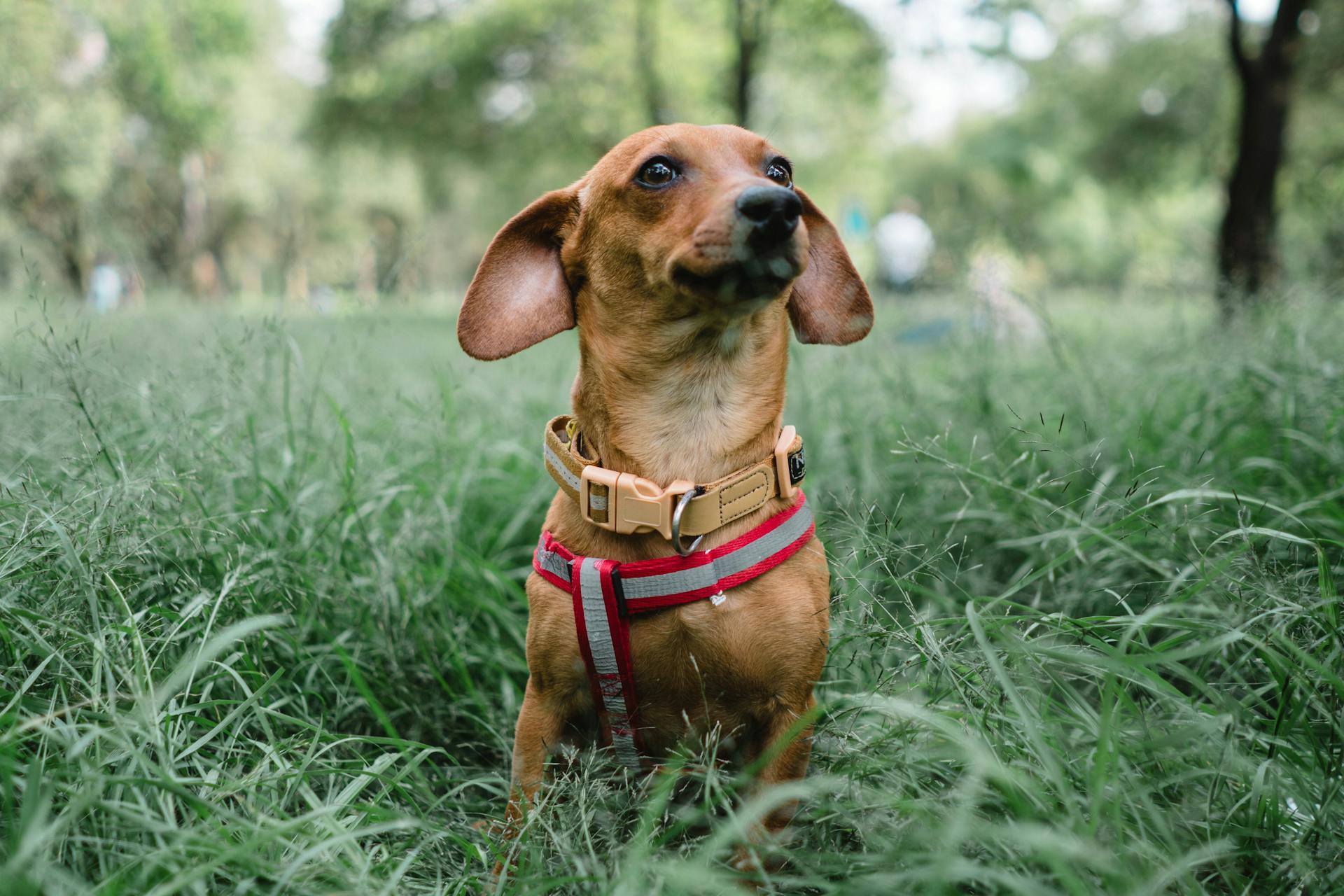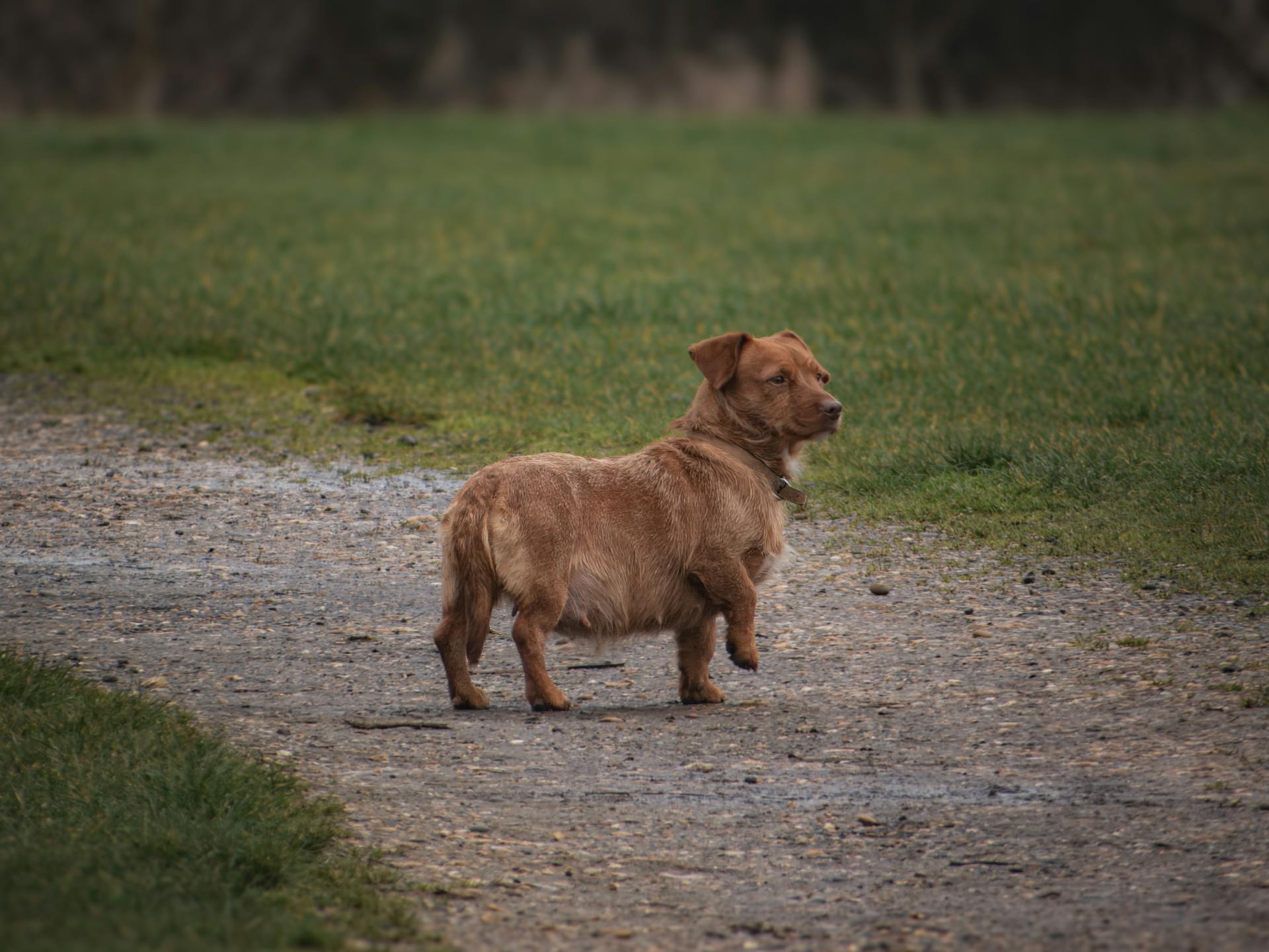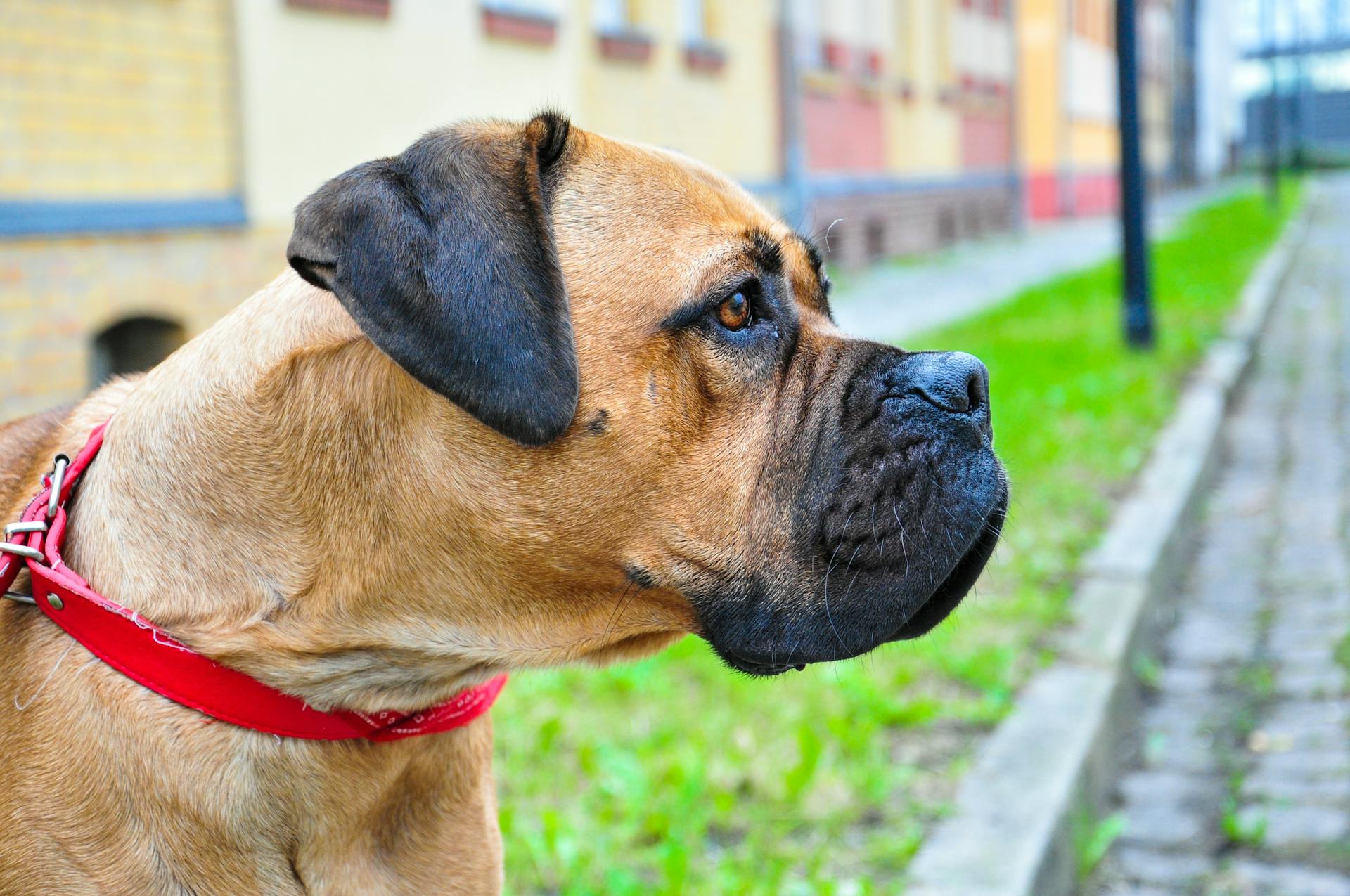
Dachshunds can be prone to aggression due to their history as hunting dogs and their strong prey drive. This means they were bred to chase and kill small animals, which can sometimes translate to aggression towards other pets or even humans.
Their size and territorial nature can also contribute to their aggressive tendencies. In fact, research suggests that dachshunds are more likely to be aggressive towards strangers than other breeds.
Dachshunds require early socialization and training to help curb their aggressive tendencies. This includes exposing them to a variety of people, places, and experiences from an early age.
Proper training and socialization can go a long way in preventing aggression in dachshunds.
You might enjoy: Early Signs of Ivdd in Dachshunds
Causes of Aggression
Dachshunds can be triggered to aggression by fear. This is a common trigger for Dachshunds, as they may not always know what's setting them off or how to control it.
Their need to protect their territory is another common trigger. Hunting dogs, for example, are trained to be hostile as part of their background for hunting correctly.
For your interest: Dachshunds Badger Hunting
Dachshunds may develop aggressive behavior due to neglect or mistreatment by their owners. This can be a result of their dependence on their owners' care and understanding.
Their genetic predisposition can also play a role in their aggression. And in some cases, sudden and seemingly unreasonable aggression may be a sign of an underlying illness that needs professional help.
What Causes Behavior?
Dachshunds can be aggressive due to fear, which is one of the most common triggers for their behavior.
Genetics can also play a role in a Dachshund's aggression, as some breeds are more prone to certain behaviors.
Poor socialization during puppyhood can lead to aggression in Dachshunds, making them fearful or aggressive towards other people or dogs.
Dachshunds that are neglected or mistreated by their owners may develop nasty behavior, including aggression.
Proper training and socialization from a young age can help mitigate behaviors like barking or snappiness in Dachshunds.
Some Dachshunds may be aggressive due to underlying medical conditions, such as illnesses that cause irritability.
Dachshunds have a strong protective instinct and can be wary of strangers or unfamiliar situations, leading to barking or snappiness.
Training and understanding your Dachshund's demeanor can help prevent aggression caused by learned behavior.
It's essential to rule out medical conditions if you notice changes in your Dachshund's behavior, as they can cause irritability or aggression.
Genetic Hunting Instincts
Dachshunds have a genetic predisposition towards aggression due to their hunting instincts. This is deeply ingrained in the breed's history as hunting dogs.
Their bodies were bred to be narrow, elongated, and close to the ground to chase prey faster and dig into dens. This is why they have sharp teeth and claws, perfect for hunting smaller animals like squirrels, rabbits, and rats.
Playing rough games with your Dachshund can stimulate its aggressive side, causing it to snarl or bite. This is especially true if you initiate rough interactions, which may lead your dog to think attacking you is acceptable.
Dachshunds are naturally fearless, carrying a hunter's instinct with them. This can manifest as aggressive behavior in certain situations, making it essential for owners to be aware of these instincts and take proper measures to manage them.
Due to Size

Dachshunds are tiny dogs, but they can give the impression that they see themselves bigger than they actually are.
Their small size may not seem like a reason for aggression, but it's a factor that contributes to their behavior. Dachshunds are more likely to show aggressive behavior towards other animals, strangers, or even their owners.
Smaller breeds like Dachshunds are surprisingly more aggressive than larger dogs. They may not cause fatal attacks, but they're likely to bark, growl, and bite when they feel provoked.
Proper socialization and training are essential to help Dachshunds overcome their temperaments and reduce the likelihood of aggressive behavior. This is especially important for their owners to work on.
Understanding Dachshund Temperament
Dachshunds are often misunderstood as inherently aggressive, but their behavior is a complex mix of genetics, training, environment, and individual experiences. Labeling them as aggressive oversimplifies their rich personalities.
Their temperament is significantly shaped by their environment, and a positive, nurturing environment with clear boundaries produces a well-adjusted dog. Neglect, inconsistency, or lack of socialization can result in behavioral issues.
Dachshunds may act aggressively due to fear, triggered by new people, loud noises, or other stimuli. Providing a safe space, such as their crate or bed, can help them feel more comfortable and safe.
Their protective instincts are a testament to their loyalty and alertness, but can sometimes lead to barking or snapping when they feel their territory or loved ones are threatened. Proper socialization from a young age can help them distinguish between genuine threats and benign situations.
Fear
Dachshunds can act aggressively due to fear, which is a common issue. This behavior is often triggered by new people, loud noises, or other environmental changes.
Providing a safe space for your Dachshund is crucial in helping them feel more comfortable and secure. Their crate or bed can serve as a haven where they can retreat when feeling anxious.
Gradual exposure to the things that trigger their fear is essential in helping your Dachshund become more confident and calm.
Worth a look: Dog Fear Aggression
Temperament: Independence and Affection
Dachshunds are intelligent and alert by nature.
Their assertiveness can sometimes be mistaken for aggression, so it's essential to distinguish between their independent streak and genuine aggressive tendencies.
Dachshunds can be wary of strangers, but they are also known for their loyalty and affection towards their families.
Understanding a Dachshund's behavior requires recognizing the difference between their independent nature and aggressive tendencies.
Dachshunds are spirited and can be quite energetic, which can sometimes be misinterpreted as aggression.
Protective Instincts: Small Dog, Big Personality
Dachshunds are known to be quite protective, which can sometimes lead to barking or snapping when they feel their territory or loved ones are threatened.
Their protective nature is not necessarily a sign of aggression but rather a testament to their loyalty and alertness. Proper socialization from a young age and exposing them to various people, pets, and environments will help them distinguish between genuine threats and benign situations.
Dachshunds may appear aggressive at times, but when they are, they are for a reason. Instinctively, Dachshunds feel obliged to protect their people and other animals they consider as part of their pack.
Discover more: When Do Rottweilers Calm down
Dachshunds are not predisposed to being friendly, although having them interact and exposed to different people during their puppyhood would help them stay calmer whenever you invite visitors into your home.
Constant barking can be a real issue you don’t want to deal with when you have friends or relatives over, so it’s better to eliminate this behavior while a Dachshund is still young.
Understanding the Multifaceted
Dachshunds are often misunderstood, and their behavior is frequently oversimplified. Labeling them as inherently aggressive ignores the complex interplay of genetics, training, environment, and individual experiences that shape their personalities.
Dachshunds can exhibit a wide range of behaviors, just like any other breed. Their behavior is a blend of genetics, training, environment, and individual experiences, making them multifaceted and unique.
Some common types of dog aggression include Fear Aggression, Protective Aggression, Territorial Aggression, Possessive Aggression, and Dominance Aggression. These types of aggression can arise from a combination of genetics, socialization, training, and even medical conditions.
For your interest: 3 Types of Dachshunds
Dachshunds are known to be protective, which can sometimes lead to barking or snapping when they feel their territory or loved ones are threatened. This protective nature is not necessarily a sign of aggression but rather a testament to their loyalty and alertness.
Proper socialization from a young age is crucial to help your Dachshund distinguish between genuine threats and benign situations. Exposing them to various people, pets, and environments can help them develop good judgment and reduce aggression.
Here are some common types of dog aggression and their possible causes:
By understanding these types of aggression and their possible causes, you can take steps to address any issues and help your Dachshund become a well-adjusted and happy member of your family.
Training and Socialization
Training and socialization are key factors in shaping a Dachshund's behavior. Consistent, positive reinforcement-based training can channel their spirited energy into constructive outlets and reduce unwanted behaviors.
A fresh viewpoint: Dachshund Crate Training
Early socialization is crucial, as Dachshunds may exhibit fear-based aggression and difficulty in interacting with other dogs or people if they're not properly socialized. Without proper socialization, Dachshunds may be fearful or anxious around new people and situations, leading to aggressive behavior.
Proper training and socialization from a young age can help mitigate behaviors like barking or snappiness, which can be a form of communication or an alert to perceived threats. Dachshunds have a strong protective instinct, so it's essential to teach them to respond calmly to strangers or unfamiliar situations.
Poor Socialization
Poor socialization is one of the most common causes of aggression in dogs. If your Dachshund has not been properly socialized, they may be fearful or anxious around new people and situations, which can lead to aggressive behavior.
Proper socialization from a young age is key. This means exposing them to new people, places, and experiences in a positive way.
Taking your Dachshund to the dog park, on walks in new neighborhoods, or to obedience classes can help them become confident and calm in new situations.
In many cases, aggressive behavior in Dachshunds is the result of anxiety or fear. If your dog is acting aggressively, it’s essential to try to identify the cause so that you can help them feel more comfortable and safe.
A study by the University of Pennsylvania found that Dachshunds were one of the top 10 breeds that were more likely to bite their owners, but this doesn't necessarily mean all Dachshunds are aggressive.
Poor socialization can lead to fear and aggression in Dachshunds, making it crucial to address this issue early on.
Core Importance of Early Socialization
Early socialization is a critical component of a Dachshund's development, and it plays a significant role in shaping their behavior. In fact, one study found that Dachshunds were one of the top 10 breeds that were more likely to bite their owners, but this doesn't necessarily mean that all Dachshunds are aggressive.
Proper socialization can help mitigate and prevent aggressive behavior by teaching Dachshunds appropriate responses and improving their overall behavior. This is because Dachshunds that are not properly socialized can become fearful or aggressive towards other people or dogs.
Early socialization exposes Dachshunds to various people, animals, and environments, helping them differentiate between genuine threats and everyday situations. It helps in reducing unnecessary wariness or aggressive reactions and fosters a well-adjusted temperament.
Here are some key aspects of early socialization:
- Exposing your Dachshund to new people, places, and experiences in a positive way
- Taking them to the dog park, on walks in new neighborhoods, or to obedience classes
- Helping them distinguish between genuine threats and benign situations
By doing so, you can help your Dachshund grow into a well-adjusted and sociable dog.
Aggression in Dachshunds
Aggression in dachshunds can be a complex issue, but understanding its causes can help you address it. Recognizing fear-based aggression and resource guarding is crucial in managing aggression in dachshunds.
Early socialization is key, as exposing your dachshund to various people, dogs, and environments from a young age can help prevent aggression. Positive reinforcement training, proper exercise, and veterinary check-ups can also help prevent boredom and frustration, which can contribute to aggression.
Take a look at this: How to Prevent Ivdd in Dachshunds
Here are some common types of dog aggression:
- Fear Aggression: This happens when a dog feels threatened or scared and lashes out in response.
- Protective Aggression: Dogs can get very territorial and protective of their family or belongings, leading to aggression towards strangers or other animals.
- Territorial Aggression: Similar to protective aggression, but focused on the dog’s physical space and boundaries.
- Possessive Aggression: Dogs can become aggressive when they feel that their resources (food, toys, etc.) are being threatened.
- Dominance Aggression: Some dogs exhibit aggression as a way to assert dominance over other dogs or humans.
Proper care and attention can go a long way in preventing aggression in dachshunds.
Are They?
Dachshunds have a hunting background, which has made them more aggressive than most other breeds. They were bred to hunt, after all, and that instinct is still present in their behavior.
Their aggression isn't typically fatal, but it's still something to be aware of. If you notice signs of aggression, it's best to give them space.
They're not afraid to take control, so be extra careful if you need to intervene.
Lack of Trust Behavior
Dachshunds may display aggressive behavior if they sense they can't trust you, such as growling when you come near.
This can be due to the way you treat them, which may have led them to feel the need to protect themselves from you.
If a Dachshund lacks discipline, it may assume dominance over its owner, leading to aggressive behavior.
Providing your dog with continuous training with a certified dog behaviorist's guidance is essential to keep it obedient.
A Dachshund's aggressive behavior can be a sign that they perceive you or a situation as a threat, causing them to feel threatened or scared.
In response to perceived threats, a Dachshund may exhibit stiff body language, such as holding its tail high and having its ears back.
By establishing clear boundaries and offering regular socialization opportunities, you can help your Dachshund grow into a well-behaved and sociable pet.
Self-Defense
Dachshunds can become aggressive when they feel threatened or perceive a potential threat to their resources. Early socialization is key to preventing this behavior, so expose your dachshund to various people, dogs, and environments from a young age.
Children need to be taught how to treat a Dachshund correctly, as they can become defensive if pestered or threatened. If your kids are around your dachshund, make sure they know how to pet or hold it gently.

Dachshunds can be good with children if they're used to being around them or have developed a close relationship. However, if they feel pestered or threatened, they won't hesitate to defend themselves.
It's essential to recognize the signs of aggression in your dachshund, such as growling or biting, and take steps to manage the behavior. A qualified dog trainer can provide tailored advice and guidance to help you address aggression in your dachshund.
Here are some tips to help you manage aggressive behavior in your dachshund:
- Minimize stressors and triggers that might provoke aggressive behavior.
- Use tools like muzzles or crates in specific situations.
- Avoid punishment, as it can worsen the problem.
Preventing
Preventing aggression in Dachshunds requires attention to their socialization from a young age, exposing them to various people, animals, and situations to help them feel comfortable and confident.
Proper socialization can make a big difference in a Dachshund's behavior. Make sure to introduce them to new experiences gradually and positively.
Working with your Dachshund to teach basic commands and obedience can also prevent unwanted behaviors like aggression. This training will help them understand what's expected of them.
Regular medical checkups are crucial if you notice sudden changes in your Dachshund's behavior, as some medical conditions can cause aggression.
Retraining and Special Cases
Dachshunds benefit from positive reinforcement techniques and clear, consistent boundaries.
Their spirited nature can sometimes make them more stubborn than other breeds, so it's essential to tailor training methods to their unique temperament.
To curb aggressive behaviors, understanding their specific needs is crucial.
Dachshunds are highly intelligent and respond well to positive reinforcement, making them a great candidate for training.
Frequently Asked Questions
How do you discipline a dachshund?
Disciplining a dachshund involves correcting bad behavior in a positive way, such as rewarding good behavior and using confinement. Consistency and short training sessions are key to effective and gentle dachshund discipline.
Sources
Featured Images: pexels.com


